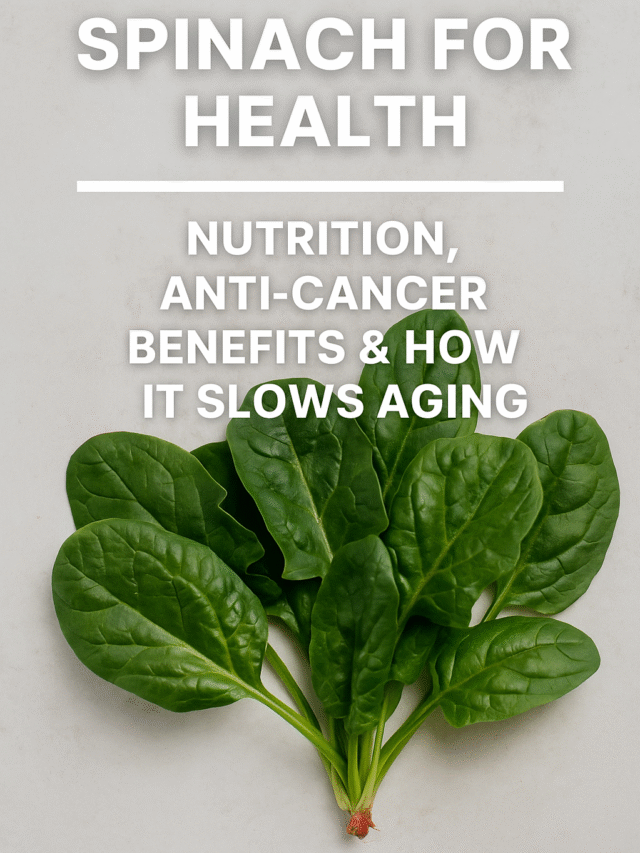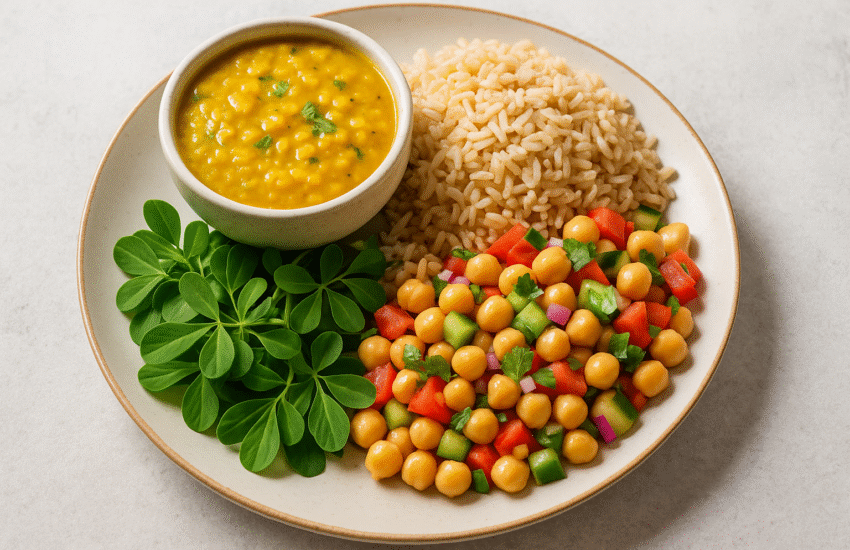Spinach for Health: Nutrition, Anti-Cancer Benefits & How It Slows Aging

Introduction
You’ve probably heard that spinach is good for you—but how good is it, really?
This leafy green is more than just a side dish. Spinach is a nutrient-dense powerhouse, rich in iron, vitamins A and K, antioxidants, and anti-inflammatory compounds. Just 100g can supercharge your body’s ability to fight cancer, repair skin damage, and even strengthen bones. The spinach health benefits are numerous, making it a staple for anyone looking to enhance their diet. In fact, incorporating spinach regularly can greatly amplify the spinach health benefits you receive.
In this guide, we’ll break down the complete nutrition facts, explore science-backed benefits, and show you exactly how to use spinach to support longevity, immunity, and beauty.
Spinach Nutrition Facts (Per 100g, Raw)
| Nutrient | Amount | % Daily Value |
| Calories | 23 kcal | 1% |
| Water | 91.4 g | – |
| Protein | 2.9 g | 6% |
| Carbohydrates | 3.6 g | 1% |
| Fiber | 2.2 g | 8% |
| Vitamin A (RAE) | 469 µg | 52% |
| Vitamin K1 | 483 µg | 402% |
| Vitamin C | 28 mg | 31% |
| Folate (B9) | 194 µg | 49% |
| Iron | 2.7 mg | 15% |
| Magnesium | 79 mg | 20% |
| Calcium | 99 mg | 10% |
| Potassium | 558 mg | 12% |
Top Health Benefits of Spinach
Understanding the spinach health benefits can help you make better dietary choices and improve your overall wellness.
Fights Cancer with Antioxidants
These remarkable spinach health benefits are backed by research and should encourage you to include more spinach in your meals.
The spinach health benefits extend beyond just nutrition; they also play a key role in enhancing your skin’s health.
Spinach contains:
– Lutein and zeaxanthin – neutralize free radicals and reduce cancer risk
– Chlorophyll – inhibits the carcinogenic effects of heterocyclic amines (formed when meat is grilled)
– Kaempferol & quercetin – anti-cancer flavonoids linked to reduced risk of ovarian, prostate, and breast cancer
Study Insight: According to the Journal of Nutrition, high spinach intake is associated with a reduced risk of colorectal and breast cancers due to its high antioxidant density.
This is why the spinach health benefits are also crucial for maintaining strong bones throughout your life.
Slows Aging & Protects Your Skin
Knowing the spinach health benefits can also motivate you to try different recipes that include this versatile green.
Spinach is packed with Vitamin A and C, which:
– Help your body produce collagen, reducing wrinkles
– Reduce UV damage and improve skin tone
– Support skin cell regeneration for that fresh, glowing look
It also provides magnesium and iron, which improve energy levels, muscle function, and brain clarity — all of which decline with age.
To fully understand the spinach health benefits, let’s look at some delicious ways to enjoy this superfood.
Strengthens Bones
Remember that the spinach health benefits are substantial, so make it a part of your daily routine.
Consider the spinach health benefits when choosing your diet to ensure you’re maximizing nutritional value.
With 402% of your daily Vitamin K, spinach:
– Improves calcium absorption
– Supports bone density and reduces fracture risk
– Prevents age-related bone degeneration
Boosts Immunity and Detoxifies the Body
– High in folate, which helps white blood cell production
– Rich in chlorophyll, which detoxifies heavy metals
– Iron increases hemoglobin levels and fights fatigue
How to Eat Spinach for Maximum Benefit
Method | Benefits
— | —
Raw (salads, smoothies) | Retains Vitamin C & folate. Best for detox.
Lightly sautéed | Increases absorption of iron and calcium
Cooked with garlic or fat (ghee, olive oil) | Enhances bioavailability of Vitamin A & K
✅ Portion: 1 bowl (50–100g) daily
✅ Frequency: Daily or 4–5 times/week
Important Note
Always consult your doctor or a licensed nutritionist before making dietary changes, especially if you are:
– Pregnant or breastfeeding
– On blood thinners (spinach is high in Vitamin K)
– Diagnosed with kidney stones (spinach contains oxalates)
– Allergic to leafy greens
FAQ – Spinach & Your Health
Q: Is spinach good for skin glow?
A: Yes! Vitamin A and C support collagen production and help repair skin tissue.
Ultimately, the spinach health benefits make it clear that this green is essential for a healthy lifestyle.
Q: Does cooking spinach destroy nutrients?
A: Some nutrients like Vitamin C are heat-sensitive, but light cooking improves iron and calcium absorption.
Q: Can spinach help fight cancer?
A: Spinach is high in antioxidants and flavonoids that reduce DNA damage and inflammation—key drivers of cancer.
Q: Can I eat spinach daily?
A: Yes, but moderation is key. Eating 1 bowl (50–100g) daily is ideal unless restricted by medical advice.
Conclusion: One Bowl, Lifelong Benefits
Spinach is more than a salad green—it’s a green shield that helps protect your body from the inside out. From glowing skin to strong bones and cancer-fighting compounds, this superfood earns a spot in your daily meals.
✅ Add a bowl of spinach to your next meal.
✅ Share this article with someone who’s building a healthier plate.
✅ Follow us for more food-as-medicine content!
CTA
Did you learn something new today?
✨ Leave a comment
📩 Subscribe to our newsletter
🔁 Share this post on WhatsApp or Pinterest





One thought on “Spinach for Health: Nutrition, Anti-Cancer Benefits & How It Slows Aging”